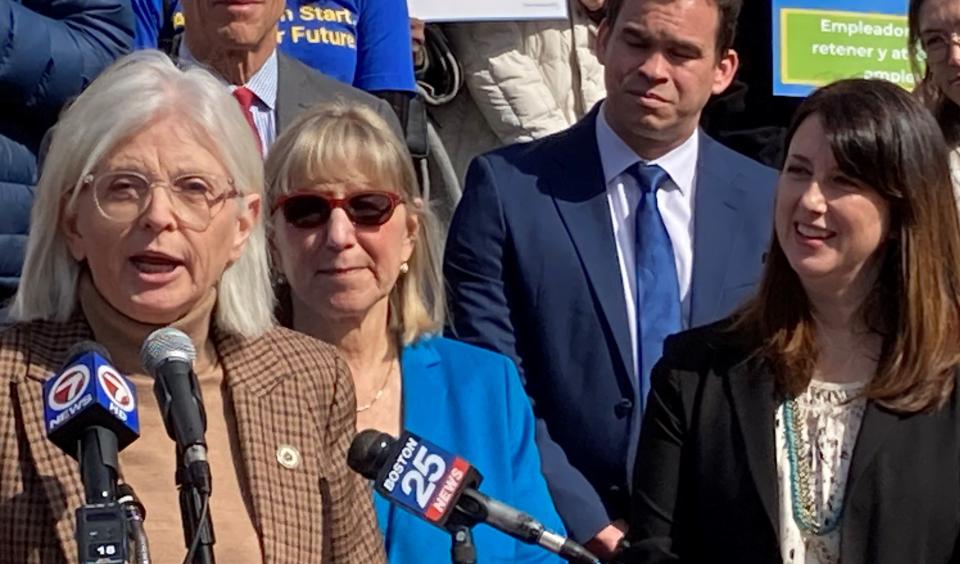Mass. Senate passes bill to make early education and child care more affordable
- Oops!Something went wrong.Please try again later.
- Oops!Something went wrong.Please try again later.
- Oops!Something went wrong.Please try again later.
BOSTON ― Massachusetts senators unanimously passed a bill to help shore up the state's struggling early education system.

The Early Ed Act, if passed by the House and signed into law by Gov. Maura Healey, could change the state’s approach to child care and early childhood education. Currently the state has a mixed care delivery system, a loose conglomeration of small family providers; corporate, multi-state chains; government-subsidized providers like Head Start; and in-business providers that offer on-site care to employees.
Massachusetts currently has most expensive child care in the nation, averaging nearly $20,000 a year, depending on the age and number of children in care, according to the Annie E. Casey Foundation.
Families complain of the lack of affordability, lack of access and availability of care in proximity to their homes or workplaces. Providers complain about the lack of a qualified workforce, high staff turnover rates and unstable funding sources.
“My colleagues and I love our work,” Alejandra de la Cruz, lead teacher at Ellis Early Learning in Boston, said at a morning rally on the State House steps prior to Senate debate on the bill. However, she said, educators cannot live on their dedication to and passion for their work.
“It is hard for us when people leave and we have to fill the vacancies,” de la Cruz said. “But we don’t blame them, they deserve to be paid for their work: they deserve to earn a living wage.”
The bill, sponsored by Senators Robyn Kennedy, D-Worcester and Sal DiDomenico, D-Everett, and brought forward by Senate President Karen Spilka, D-Ashland, proposes to change all that.

It’s not a question of “babysitting,” said Kennedy. “That’s the worst myth about child care and early education."
She called providers “the backbone” of the Massachusetts economy.
What would change for providers?
The bill includes the following measures intended to help providers:
It makes permanent the Commonwealth Cares for Children, or C3 Grants for providers, which were included in the state budget for the current fiscal year. Of all licensed providers in the state, 92% receive the grants.
It sets pay and benefit standards for early education/child care workers, on par with educators in the public school system.
It establishes a career ladder for early childhood educators that includes scholarships and loan forgiveness.
For providers receiving state subsidies, reimbursements would be based on the actual cost of care, including staffing costs, and would be based on enrollment rather than attendance.

What would change for families?
The bill would raise the income threshold for access to subsidies to 85% of the state median income, allowing a family of four earning up to $124,000 to qualify. Current law limits subsidies to families earning 50% or less of the state median income, or $73,000.
The bill would eventually allow families earning 125% of the state median income to apply for a subsidy, "subject to available funding."
Cost sharing for families receiving subsidies would be capped at 7% of income and would be eliminated for families below the federal poverty level ($35,140 for a family of five, in 2023).
Fees charged to families would be renewed every five years.
Bill attempts to narrow achievement gap
Children with access to quality early education have greater academic success throughout their school years, Kennedy said. The right programs, she said, can set the stage for better communication skills, enhanced social and emotional learning and interpersonal skills.
Kennedy said the bill will go a long way to narrowing the state’s academic achievement gap.
According to Strategies for Children, an organization that supports early childhood education and sponsors the Eye on Education blog, Massachusetts is home to "glaring and persistent disparities in opportunity and achievement that separate low-income students and students of color from their peers.”
A report released by Massachusetts Education Equity Partnership in 2018, found that fewer than one in three Black and Latino 4th graders was at grade level in reading; that only 28% of low-income eighth graders were at grade level in math; and that one in three English learners didn't graduate on time, while one in seven dropped out of school. The organization has indicated that the gap has been exacerbated since the COVID-19 pandemic.
The report attributes the achievement gaps, in part, to the lack of access to early childhood education.
“Education is the great equalizer in society,” Kennedy said.
The high cost of child care and early education is a problem that affects all other aspects of the state’s economy, Spilka said.
Search for permanent funding
The C3 grants originated from the COVID-19 pandemic and were issued by the federal government. When the federal government ended the grant funding wasn’t needed, Massachusetts extended them through the budget process.
The C3 grants were funded at $475 million in the current fiscal year, and the governor is recommending another $475 million infusion of the grant money next fiscal year – though she's having to find more creative ways to cover that as tax collections trail off.
Supporters say permanent funding would help keep spots open in existing centers; ensure stable tuition prices; and allow operators to hire an educated, qualified and dedicated work force.
Included in the bill are incentives for establishing new centers focused on children of low-income families or special needs students, and in communities that lack child care options. The bill would also increase the maximum number of children allowed in large programs.
The Senate passed a similar bill in the last legislative session that ended in 2022. This session, the Senate took up the bill earlier in the second year as to give more time for the House to pick up the bill.
Kennedy, who was chief operating officer for the YWCA of Central Massachusetts before running for Senate, was a sponsor of the bill.
“Just across my city there are dozens of classrooms that are dimmed or darkened because they lack educators to staff them,” Kennedy said.
“We owe it to the educators to pass this bill."
-With reports from State House News Service.
This article originally appeared on Telegram & Gazette: Refiled by freshman Sen. Robyn Kennedy, bill now goes to the House

